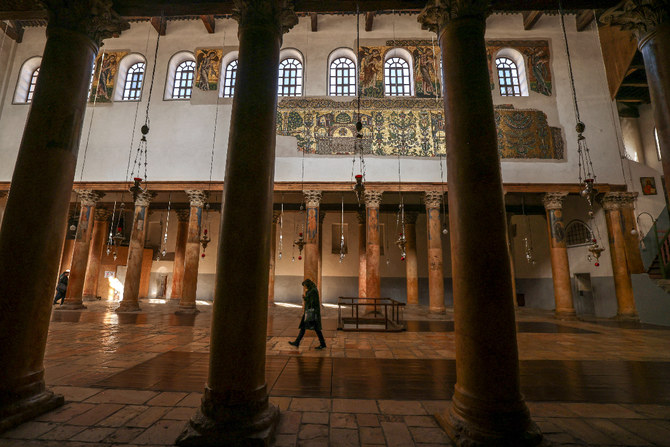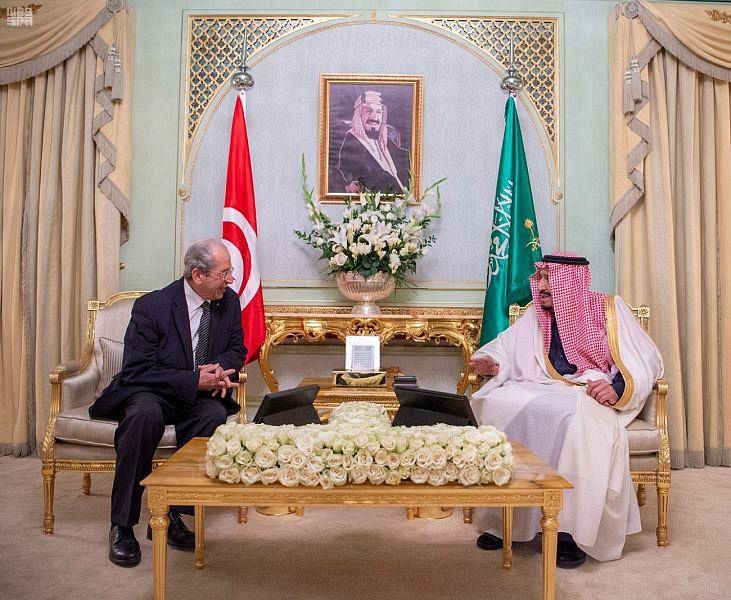
Attacks by Israel ‘a reminder of the massacre by Herod,’ Hanna Hanania says
But ‘people of our city and the people of Palestine want real peace,’ he says
AMMAN: The conflict in Gaza has cast a shadow over Bethlehem, the revered birthplace of Jesus. Its mayor, Hanna Hanania, spoke to Arab News about the detrimental impact the Israeli blockade has had on the city’s tourism industry, a vital economic lifeline.
“The harsh closure that Israel has placed on Bethlehem has cut off any possible tourists or pilgrims wanting to visit the city, but it also denied us the possibility of internal tourism,” he said.
In a mark of solidarity with the Palestinian people, Bethlehem’s city council will this year curtail its usual Christmas festivities.
“In keeping with the traditional status quo, we will still welcome the heads of the three churches as they make their annual Christmas visits to Bethlehem. Boy Scouts will still march but without music. No lighting of the Christmas tree or any other decorations will take place and Christmas Eve will be simply a religious ceremony,” Hanania said.
The mayor sees a parallel between the situation in Gaza and the ancient tragedies that befell Bethlehem.
“The attack on Gaza and the massacre of children is a reminder of the massacre by Herod of the children of Bethlehem when Jesus was born,” he said.
“Bethlehem was the recipient of the message of peace 2,000 years ago and this is the message we want to proclaim. The people of our city and the people of Palestine want real peace.”
In a recent meeting with the British ambassador, Hanania voiced his displeasure at the envoy’s repetition of the Israeli narrative, stressing the deep-rooted issues faced by Palestinians.
“Our problems did not start on Oct. 7, but we have been suffering discrimination and attempts at usurping our land and our rights ever since Balfour made his infamous promise to allow Jews to steal our land.”
During the meeting, Hanania highlighted the disparities between Palestinians and the residents of the nearby illegal Jewish settlements. He pointed to the inequitable distribution of resources, particularly water, where settlers receive twice as much water from the Bethlehem aquifer.
“They receive 150 liters per capita per day, we receive 65 liters per capita per day even though the water comes from Bethlehem aquifer,” he said.
Since Oct. 7, the city had grappled with inflated prices and limited access to fresh produce due to the blockade, he said.
Environmental concerns had also escalated due to restricted access to waste disposal facilities in Hebron, compelling the use of a temporary, less safe dump in Beit Sahour.
Last year’s municipal elections were a watershed moment for Hanania’s mayoral journey.
“The 2022 municipal elections in Bethlehem were very problematic,” he said. “Eleven lists participated, but although we won the most, five seats, and I was the top vote-getter, it was hard to make a coalition, as everyone wanted to be mayor.”
A senior Palestinian official’s intervention led to a rotational agreement, under which Hanania’s term will end on Jan. 8.
His tenure has been marked by strategic initiatives aimed at enhancing Bethlehem’s financial and cultural landscape. He successfully lobbied for the city to be part of a pilot project allowing it to directly collect housing taxes, thereby addressing the critical issue of cash flow delays from the Palestinian Authority.
Hanania has also spearheaded significant tourism projects, including the renovation of the Bethlehem Museum near the Church of the Nativity, has been an advocate for cultural preservation and has worked to enhance the city’s appeal as a center for religious and historical tourism.
He has been instrumental in promoting Bethlehem’s heritage, advocating for the preservation of its historical sites and traditions, which are integral to its identity and tourism appeal.
This initiative, combined with a mandatory museum tour for church visitors, promised to ease congestion and generate significant revenue. The development of a walking tour along the historic Star Street, a UNESCO World Heritage site, and the implementation of a tourist tax, were also part of these efforts.
“The museum was scheduled to have a religious narrative, a national narrative and a cultural narrative of the city of Bethlehem,” he said.
“Tourists would have to pay a small fee of $5, this would bring about $10 million to the city’s coffers because we normally have an average of 2 million visitors (a year) to the Church of the Nativity.
“The museum tour would help reduce the heavy traffic at the church and would provide shelter for the tourists from the rain or the hot summer until their turn to visit the birthplace of Jesus.”
While the Gaza conflict has stalled many of Hanania’s plans, he remains optimistic about their long-term benefits. He draws inspiration from an Arabic proverb about sowing seeds for future harvest, hopeful that his efforts will yield positive outcomes for Bethlehem and its people.
As his mayoral term draws to a close, he said he envisioned a future in which Bethlehem could thrive as a beacon of culture, history and peace, drawing visitors from around the world to its sacred sites.












